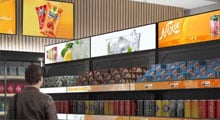There are several types of barcode scanners on the market made to meet the needs of various industries. You need to pay attention when choosing new barcode readers as part of your business’s barcode scanning system business. There are several factors to consider, such as a barcode reader’s ability to integrate with existing software, workflows, tools, its familiarity with employees, and ease of use.
The Top Specs to Consider Before Buying Barcode Readers
Integration with Management Systems
You need to choose a scanner that will seamlessly integrate with your current management and ERP systems–without demanding additional programming. This allows you to update and transmit data easily between your asset management systems for an up-to-date asset management system. You will come across simple barcode readers that decode and transmit data or sophisticated scanners with keypads that allow you to enter and edit data. Some come with operating systems such as Android, making it easy for you to manage them with your mobile devices, while others have a Software Development Kit (SDK), giving you the option to customize applications to meet your needs. SDK software offers limitless options.
Communication
In today’s fast-paced world, you need to look for a barcode scanner that can communicate with your other devices and share information on demand. You will come across WiFi/web-enabled scanners where you can automatically update information to your system. If you do not need your data immediately, you can choose a more cost-effective offline scanner that transmits data automatically when connected to business computers and other work devices.
Working Environment
If you work in production sites with water and dust, you need a dirt- and water-resistant barcode scanning system. If you also have a lot of powder, you need a barcode scanner system that limits powder from getting into the hardware.
Outdoor working environments also demand a different set of scanners with rugged durability. You may need a barcode scanner that can withstand and survive in extreme weather conditions. By considering the conditions your barcode readers may be exposed to, you can choose a more durable scanning system to serve you longer.
App Support
Today scanners serve as small computers that integrate different apps into your scanning system, If you choose a scanner that allows you to use apps, choose one with a fast interface that can run several applications simultaneously without slowing down workflow.
Compatibility and Flexibility
Any barcode readers you buy should be reliable and fast with zero downtime as you work. You must also choose a barcode system that you can input into multiple devices such as computers and printers.
Another important aspect is your reader’s ability to read multiple types of barcodes. Avoid any scanners that require reprogramming when you change barcode formats or introduce new products. Lastly, choose a scanner you can manage from a smartphone application, allowing you to reduce your reliance on complex and bulky hardware.
Mobility
A wireless barcode system is applicable in multiple settings and allows you to move around as much as necessary to keep up with business demands. There are two types of cordless barcode scanners:
- One that transmits data wirelessly to your system, and
- One that you need to connect to a device to transfer data.
One factor to consider with the latter, cordless scanner is the amount of data it can capture and store without requiring a transfer. If you chose the former, choose a Bluetooth-enabled scanner to help you update real-time data without overloading the scanner with data for easier workflow.
Charging and Power Requirement
One important factor to help you make a decision is the barcode readers’ power requirements. If you have the scanner running for up to 12 hours in the field, you need a handheld, wireless scanner with a long battery lifespan. Compare the lifespan of your scanner with the frequency of use. For example, if you are scanning continuously throughout the day, you may need an interchangeable battery or a mobile charging system. If you find a barcode system you love with a short battery life, consider purchasing additional batteries to ensure no interruptions to your workflow.
Warranty
One final consideration is the warranty agreement from the manufacturer. Ideally, barcode system warranties run for several years, with different specifics as set by the manufacturer. Choose the longest and most comprehensive warranty possible.
Conclusion
Often, you will come across a myriad of options, which can get overwhelming and complex. Take your time to assess your business requirements and your environment before making an investment. The decision you make while purchasing a barcode system will affect productivity among team members, improve your ability to collect and process data, as well as boost the overall effectiveness of your business. Need help narrowing the right reader for your company? Contact one of our barcode system experts today.




















